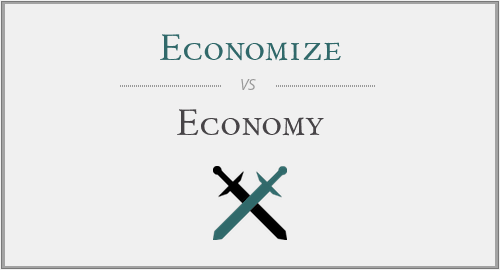Introduction
The words 'Economize' and 'Economy' are often used in discussions related to saving resources or managing finances. However, they serve different linguistic purposes and have unique grammatical features. In this article, we will delve into their differences and similarities, focusing on grammar, etymology, and contextual usage.
Definition and Usage
Economize
'Economize' is a verb that means to save money or resources by using them carefully and efficiently. It involves making deliberate efforts to reduce expenses or waste. Here are examples of 'Economize' in sentences:
- "They decided to economize by cutting unnecessary expenses from their budget."
- "Economizing on energy consumption is essential for environmental conservation."
Economy
'Economy' is a noun that refers to the system or structure of production, distribution, and consumption of goods and services in a country or region. It encompasses various aspects, including industries, trade, employment, and financial management. Examples of 'Economy' in sentences include:
- "The country's economy is experiencing steady growth."
- "The global economy has been impacted by recent trade policies."
Grammatical Roles
Grammatically, 'Economize' functions as a verb and typically appears in sentences as an action carried out by an individual or entity:

- "She is trying to economize by reducing her daily expenses."
- "The company is economizing on production costs to increase profitability."
'Economy,' as a noun, can serve various grammatical functions, including being the subject or object of a sentence, or as part of phrases and clauses:
- "The government's policies have a significant impact on the economy."
- "Understanding the principles of a market economy is essential for entrepreneurs."
Origins
The words 'Economize' and 'Economy' have distinct origins:
- 'Economize' has its roots in the Greek word 'oikonomia,' which means 'household management' or 'frugality.' It entered English in the early 17th century, primarily referring to prudent financial management.
- 'Economy' also has Greek origins, derived from 'oikonomia.' It evolved to encompass broader concepts related to the management of resources within a society or region.
Conclusion
In conclusion, 'Economize' and 'Economy' are related terms that share a common linguistic root but have distinct meanings and grammatical roles. 'Economize' is a verb that pertains to the act of saving resources or money through efficient management, while 'Economy' is a noun referring to the overall system of production, distribution, and consumption of goods and services within a society or region. Understanding these differences enhances precise communication and ensures the correct usage of these words in English.




Have a discussion about this article with the community:
Report Comment
We're doing our best to make sure our content is useful, accurate and safe.
If by any chance you spot an inappropriate comment while navigating through our website please use this form to let us know, and we'll take care of it shortly.
Attachment
You need to be logged in to favorite.
Log In